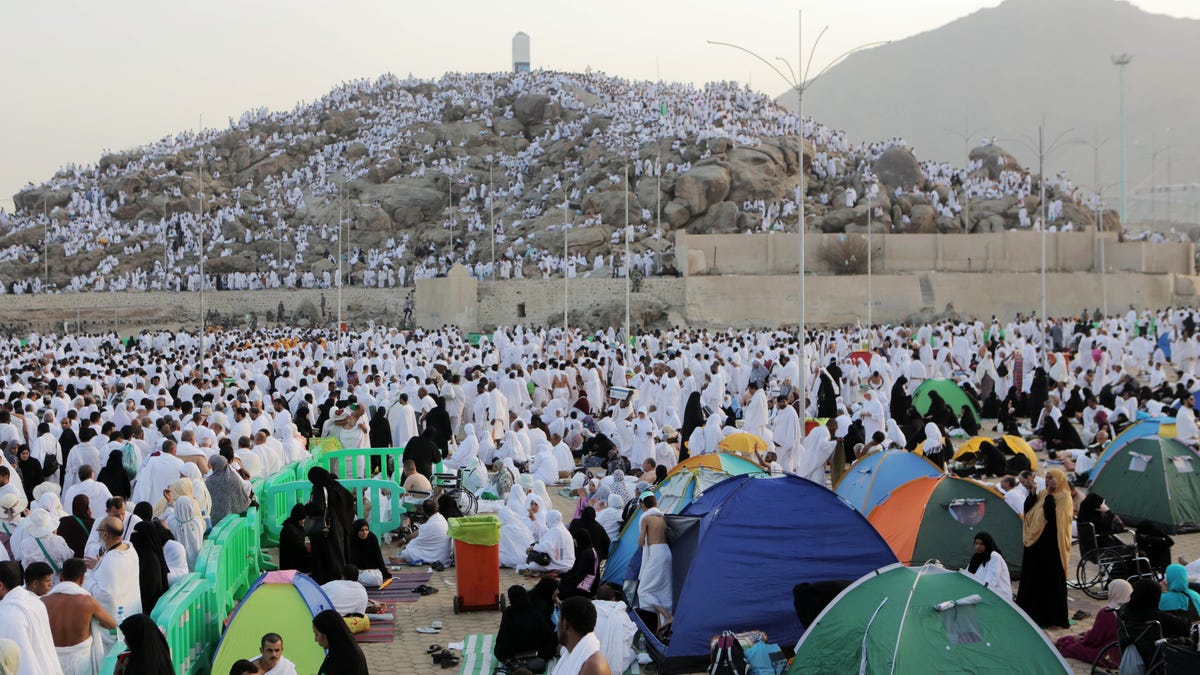
Oct. 3, 2014 - Muslim pilgrims gather to pray at the Plain of Arafat during the annual hajj pilgrimage, near Mecca, Saudi Arabia. Some 2 million Muslims are streaming into a tent city near Mecca. Saudi Arabia banned hajj and work visas this year for people from Sierra Leone, Liberia and Guinea as a precaution to avoid the spread of Ebola. (AP)
Saudi officials are taking precautions against the threat of the deadly Ebola virus, to protect the two million Muslims from around the world gathering in Saudi Arabia Friday for the Islamic hajj pilgrimage.
The Saudi kingdom refused visas to Muslims traveling from Sierra Leone, Guinea and Liberia-- the countries worst hit by Ebola— screened pilgrims arriving from West Africa, and asked all visitors to fill out medical screening cards that detail their travels over the past three weeks, the BBC reported.
Of the nearly 1.4 million Muslims expected to travel from abroad, there were likely 7,400 excluded due to this year’s restrictions. The Saudi health ministry said Thursday it’s been working with the World Health Organization and U.S. Centers for Disease Control and Prevention to contain the threat of Ebola, which has killed 3,300 people in West Africa this year.
"All pilgrims arriving through the 15 entry points had to fill in an application to tell us where they have been over the past 21 days, since that's the incubation period for Ebola," Saudi Health Ministry spokesman Khaled Mirghalani told Reuters.
Pilgrims flooded into Mona, near the holy city of Mecca, Friday for the start of the five-day Islamic ritual. The faithful believe that on this day the gates of heaven are open, prayers are answered and past sins can be forgiven.
"We came from Lagos and went through screening there and again have been tested here in Saudi, so for sure we don't have anything," Abdelsamad Shoudany, a Nigerian doctor told Reuters in Mecca.
Saudi authorities recently established a Command and Control Center (CCC) to deal with any outbreak or natural disaster, and have deployed mobile laboratories to quickly test any suspected cases of the virus.
The kingdom also reduced the numbers allowed to perform hajj for safety reasons, because of construction to enlarge Mecca’s Grand Mosque. Its security services circled Islam's sacred city with checkpoints and other measures to prevent people arriving for the pilgrimage without authorization.
During the hajj, all male pilgrims, regardless of wealth or status, wear seamless terry white cloths to symbolize equality before God. Women cover their hair and wear long loose clothing, forgoing makeup and other adornments to help them detach from worldly pleasures and outward appearances.
A few pilgrims were wearing face masks or surgical gloves to protect them against the transmission of Ebola or other diseases Friday.
"We had no suspected cases of Ebola or MERS among the pilgrims so far," Mirghalani said.
In addition to Ebola, health officials are also concerned about MERS – or Middle East Respiratory Syndrome—which hit Saudi Arabia badly last spring.
Since 2012, there have been more than 750 cases of MERS in the country. 319 people died, including some health workers, the BBC reported. Four new cases have been confirmed in the past week, including two in Medina and Taif where hajj pilgrims often travel, health officials said.
In case of an outbreak of any infectious disease, authorities have nearly doubled the number of health personnel at the hajj medical centers to 22,000 from around 12,000 last year, Tariq Ahmed Madani, a special MERS consultant to the Health Ministry told Reuters.
"I can't afford to get MERS or Ebola or any virus. I have my family to take care of," said Rubina Fahim, a Pakistani mother of three.
But the threat of dangerous diseases did not overshadow the significance of the pilgrimage for some.
"I've waited all my life to come here and honestly I wish to die here, so getting a virus is the last of my fears. As you see, I'm already in a wheelchair," said Ismail Saleh, a 71-year-old pilgrim from Egypt.
While following a route that the prophet once walked, the rites are believed to ultimately trace the footsteps of the prophets Ibrahim and Ismail, or Abraham and Ishmael as they are named in the Bible. The journey of hajj brings together Muslims of all stripes and backgrounds, praying side-by-side in and around Mecca.
The pilgrimage is physically demanding and involves performing several rites, such as circling the cube-shaped Kaaba seven times at the start and finish of the hajj. It is a main pillar of Islam and one that all able-bodied Muslims must perform once in their lives.
The pilgrims will leave Mount Arafat -- about 12 miles east of Mecca -- around sunset to collect pebbles to be used in a symbolic stoning of the devil on Saturday, which marks the first day of the Islamic holiday Eid al-Adha.
The Associated Press and Reuters contributed to this report.
